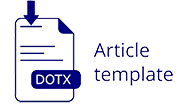Common Lexical Errors Made by Machine Translation On Cultural Text
Abstract
Machine translation is one tool of Google that presents various languages to translate. As a translator machine, the results of Google Translate are not always perfectly correct. The result of translation can be called pre-translation, which is still needed to be revised. Pramoedya Ananta Toer's Arok Dedes story is one of the Javanese stories that contain elements of culture. Translating texts which contain elements of a culture is not easy because one region to another have different cultures, so that it is difficult to look for parallel words that contain cultural, religious, social, customs, social organization, procedure, sign language, and ecology elements, and Google cannot translate the term of cultural words easily. This study is aimed at two main purposes: (1) finding out the types of lexical errors made by machine translation in translating cultural text and (2) knowing the most dominant type of lexical errors made by machine translation in translating cultural text. This study was carried out in a population of 553 pages of Pramoedya Ananta Toer's Arok Dedes. A simple random sampling technique was done to select samples. The total samples taken in this study were 30% of the population. The study results are that there are only 9 types of the total 21 types of lexical errors, namely calque, misselection, consonant-based type, false friend, vowel-based type, inappropriate co-hyponym statistically weighted preferences, semantically determined word selection, and preposition partners. The most dominant error of lexical errors is calque.
Keywords
Full Text:
PDFReferences
Arifin. (2011). Metode Penelitian Kualitatif, Kuantitatif, dan R & D. Bandung: Alfabeta
Arikunto, S. (1992). Prosedur Penelitian. Jakarta: Bina Aksara
Arikunto, S. (2006). Metodologi Penelitian. Bandung: Rineka Cipta
Brown, H.D. (1987). Principles of Language Learning and Teaching. Prentice Hall.
Corder, S.P. (1981). Error Analysis and Interlanguage. London: Oxford University Press
Ginting, H.K.B & Rahmawati, P.P. (2019). Error Analysis on Using Simple Past Tense in Writing Recount Text at the Eight Grade of SMP Bina Bersaudara 1 Medan. Jurnal Edulingua, 6(1).
Hemchua, S. & Schmitt, S. (2016). An Analysis of Lexical Error in the English Composition of Thai Learner. Srinakharinwirot University Bangkok: The University of Nattingham. Prospect: Vol. 21, No. 3
Hemchua, S. (2006). "An Analysis of Lexical Errors in the English Composition of Thai Learners". Bangkok: Norbert Schmitt, 21
Hoed. (2006). Teori dan Masalah Penerjemahan: Sebuah Pengantar Ringkas. Jakarta: ProDC
House, J. (2015). Translation Quality Assessments. Routledge
James, Carl. (1998). Errors in Language Learning and Use: Exploring Error Analysis. New York: Longman
Jurianto, Robby Andre. (2012). An Analysis of Lexical Errors in the English Narrative Writing Produced by the Tenth Grade Students of SMA Negeri 9 Surabaya in EFL Classroom. English Department: Universitas Airlangga
Kariadi, M. T, Purwaningsih, D.R. & Wahyu, TSP. (2017). Identifying Students' Diction Errors in Translating News: A Case Study in A Genre-Based Translation Class. Jurnal Edulingua, 4(2)
Keshavarz, M.H. (1999). Contrastive Analysis and Error Analysis. Tehran: Rahnama Press
Komariah, A. & Satori, D. (2011). Metodologi Penelitian Kualitatif, Bandung: Alfabeta
Kumparan.com Tekno & Sains. (2020). https://kumparan.com/channel/tekno-sains
Larson, M. L. (1984). Meaning Based Translation: A Guide to Cross-Language Equivalence. University Press of America
Llach, M. P. (2005). A Critical Review of the Terminology and Taxonomies used in the Literature on Lexical Errors. Miscelanea: A Journal of English and American Studies, 1(31), 11-24
Malhotra, R. Five Global Values. Retrieved from http://www.fiveglobalvalues.com
Napitupulu, S. (2017). Analyzing Indonesian-English Abstract Translation in View of Translation Errors by Google Translate. International Journal of English Language and Linguistics Research, 5(2), 15-23
Newmark, P. (1988). A Textbook of Translation. Hertfordshire: Prentice Hall
Nida, E.A. & Taber, C. R. (1969). The Theory and Practice of Translation. Leiden: E. J. Brill.
Pateda, M. (1989). Semantik leksikal. Flores: Nusa Indah
Sudaryanto. (1992). Metode Linguistik. Yogyakarta: Gajah Mada University Press
Syahrina, A. (2011). Online Machine Translator System and Result Comparison. University of Boras: School of Business and IT
Wells, N. (2013). A Lexical Error Analysis of Advanced Language Learners' Writings
Zughoul, M. R. (1991). Lexical choice: Towards writing problematic word lists. International Review of Applied Linguistics, 29(1), 45-60.
DOI: https://doi.org/10.34001/edulingua.v8i1.1524
Article Metrics
Refbacks
- There are currently no refbacks.

Ciptaan disebarluaskan di bawah Lisensi Creative Commons Atribusi 4.0 Internasional.











